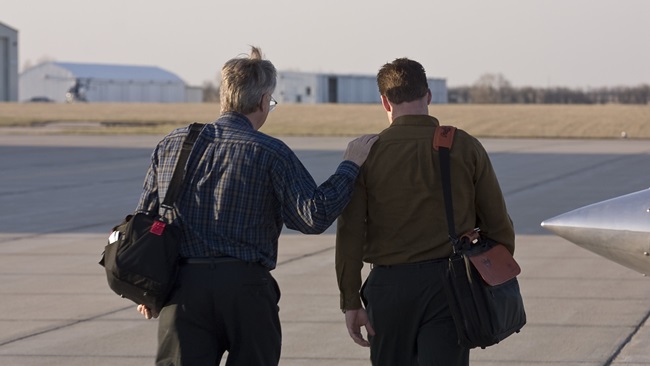Some members of Congress are attempting to counter what they described as alarmism from the Obama administration about the drastic cuts to FAA service and staffing that would occur after March 1 under sequestration.
The agency can “absorb” curtailed spending—estimated at $600 million for the remainder of the fiscal year—without compromising safety or efficiency or furloughing staff, said House Committee on Transportation and Infrastructure Chairman Bill Shuster (R-Pa.); Sen. John Thune (R-S.D.), ranking member of the Senate Committee on Commerce, Science, and Transportation; and Rep. Frank LoBiondo (R-N.J.), chairman of the House subcommittee on aviation, in a joint statement.
“We are disappointed by the Administration creating alarm about sequestration’s impact on aviation,” they said. “Before jumping to the conclusion that furloughs must be implemented, the Administration and the agency need to sharpen their pencils and consider all the options. Prematurely outlining the potential impacts before identifying other savings is not helpful.”
Since August 2012, Congress has requested information from the FAA, “but nothing was provided, and today’s exaggerations are not backed up by any real financial data,” they said, asserting that the FAA “is well positioned to absorb spending reductions without compromising the safety or efficiency of the National Airspace System.”
The two House members and senator questioned FAA budget growth in recent years—including consultants, supplies, and travel. With domestic flights still “down 27 percent from pre-9/11 levels, over the last ten years the FAA’s annual budget has increased almost $3 billion, or 41%, in its Operations account.”
Shuster and Thune also sent a letter to Transportation Secretary Ray LaHood on Feb. 25, requesting a summary of plans for FAA spending at current the level, and “at the sequester level.” They added that requests for the information had gone unanswered since last August.
On Feb. 27, House aviation subcommittee Chairman Frank LoBiondo (R-N.J.) held a hearing to focus on the FAA’s progress in implementing the FAA Modernization and Reform Act of 2012, following the one-year anniversary of the measure being signed into law. This was the first hearing of the subcommittee in the 113th Congress, as well as LoBiondo’s first as aviation subcommittee chairman. From the beginning of the hearing, though, a tone was set that this would not be a hearing about implementation of the FAA bill passed last year, but would be focused on sequestration. FAA Administrator Michael Huerta was the only witness.
Rep. Sam Graves (R-Mo.), an AOPA member and co-chair of the House General Aviation Caucus, made a point at the hearing that the sequestration cuts return the agency to its 2010 spending levels and questioned how the agency’s budget had increased by more than $900 million between 2008 and 2012.
"The sky isn't falling. We're not going to have more meteors hit because of sequestration. I don't understand why the administration continues to take this attitude that the world is absolutely falling apart as a result of this," Graves said.
“AOPA is grateful to our newly appointed committee leaders who oversee transportation and aviation in Congress for being out front on these issues, raising important questions, and asking for answers,” said Lorraine Howerton, AOPA vice president of legislative affairs. “Uncertainty about sequestration is predicated on the fact that until sequester hits, we do not know from the FAA where the hurt will be felt. These answers start with the agencies such as FAA, who will implement these cuts.”


